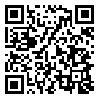
 , A Alizadeh Mradkandi
, A Alizadeh Mradkandi 
 , H Mozaffari Khosravi
, H Mozaffari Khosravi 
 , H Fallahzadeh
, H Fallahzadeh 
 , M Momeni Sarvestani
, M Momeni Sarvestani 

Background: Lack of nutritional knowledge and subsequently inadequate practice causes health problems such as malnutrition and communicable diseases. Few studies have compared the effect of educational methods on knowledge, attitude and nutritional indices of women. This study there fore was carried out with the aim of comparing the effect of peer education and education by health personnel on knowledge, attitude and nutritional indices of women.
Methods: In this quasi-experimental study, 108 women who had referred to Orumieh health care centers were investigated. Out of all health care centers of Orumieh, 4 were selected randomly two of which were assigned for peer education and the two others for by-personnel education. In each health care centers, 27 women aged 18-35 were entered in the study randomly.
A valid and reliable questionnaire was used for data collection. First a pretest was conducted for both groups. In peer education group, two of the participants who obtained the highest scores were selected as peer educators. Both groups received 4 two-hour-education sessions. Six weeks after education sessions,a post test was performed. Data were analyzed using independent T-test and paired T-test.
Results: Before intervention, the mean score of knowledge, attitude, GDI, FCI, and MCI, was 25.48, 6.68, 7.77, 5.38 and 2.11 in personnel education group and 30.38, 8.20, 7.78, 5.75 and 2.33 in peer education group respectively. After education these scores were, 31.83, 8.88, 7.25, 4.9 and 2 in personnel education group and 34.4, 15.4, 5.33, 3.62 and .85 in peer education group respectively. There was a significant difference in mean scores of knowledge, attitude and nutritional indices in both groups. The mean score of knowledge was increased significantly higher in personnel education group but, the other variables proved significantly higher in peer education group.
Conclusion: The higher increase of knowledge score in personnel group indicates the weakness of peers in presenting scientific and theory subjects, but they are more sufficient in increasing attitude and practices, so applying this method in nutrition education is recommended.
| Rights and permissions | |
 |
This work is licensed under a Creative Commons Attribution-NonCommercial 4.0 International License. |
